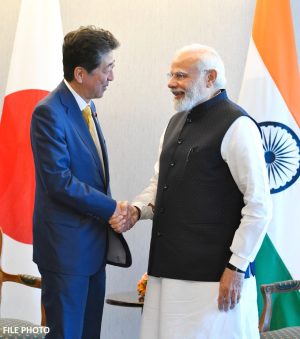One of the sharpest strategic minds of his generation, a transformative thought-leader elevating Japan’s global profile, a potent advocate of the rules-based international order, and one of the most cherished names in the power corridors of Indo-Pacific capitals – that’s Abe Shinzo.
A global statesman of Abe’s stature, consequence, and intellectual calibre is a rare occurrence in Japanese political leadership.
Culling out his vision from his political philosophy, book and other writings, successive election campaigns, and a series of historic speeches delivered over the last two decades encapsulates a man on a definitive mission: re-engineering Japan’s status in the international system as a respected, trusted, and a strong power.
Key tenants of the “Abe Doctrine” remain embedded in his belief that Japan must be a “tier-one” power decisively shaping international relations as articulated in his “Japan is Back” speech at the Center for Strategic and International Studies. He spun the “reactive Japan” narrative and pushed the envelope with a carefully crafted concept of “proactive contributor to peace,” thus reinventing Japan’s character as a security actor.
He kept value-based diplomacy front and center. From the Shangri-La Dialogue to Davos, he hit the right notes by putting up the banner “Japan for rule of law, Asia for rule of law, and the rule of law for all of us.” The message was crisp, and unmistakably touched a nerve in Beijing.
He was equally conscious of geoeconomic statecraft. He positioned Japan centrally not just as an agenda-setter but a rule-maker, be it mega free trade agreements or defining the principles of data governance.
China loomed large in his strategic thinking. Strategic foresight enabled him to perceive the coming clash in the competing visions of regional order. As such he started designing a grand strategy to manage the altering balance of power, political values, and ideology. He was driven by the urgent need to shape the strategic environment around Japan, instead of the other way around.
Thus started the churning of a pivotal idea which eventually came to be known as Abe’s biggest contribution to international politics: the Free and Open Indo-Pacific (FOIP). From the original framing of the “Confluence of the Two Seas” to a much firmer articulation a decade later at the Tokyo International Conference on African Development (TICAD), FOIP was a cautiously nurtured maritime framing.
Abe remained unmatched as a thought leader when it comes to strategic innovation, be it his concepts of a “Broader Asia” or “Asia’s Democratic Security Diamond.”
India in Abe’s Strategic Calculus
As Abe re-calibrated Japan’s strategic options amid China-U.S. tensions at the global stage and Japan-China disequilibrium at the regional stage, Japan opted for internal and external balancing. India started featuring in Abe’s strategic coordinates. The rise of India commanded space in key policy documents, white papers and bluebooks.
Notably, Delhi was factored into Tokyo’s geostrategic outlook as Washington started weighing India as a credible security partner. Since the mid-2000s, especially with reference to the conversation in the Japan-U.S. 2+2 around 2007, India’s potential to be an effective partner in the Asia-Pacific became a fairly regular theme.
Around the same timeframe, when Japan was brainstorming its options in the wake of arrival of China, strategist Andrew Marshall categorically told Japanese colleagues to “look at India.” This, coupled with Abe’s own strategic bent of mind, broadly set the stage for his historic speech at the Indian Parliament, “Confluence of the Two Seas.”
Japan’s maiden National Security Strategy which came in 2013 and pre-dates Abe’s formal articulation of FOIP, analyzes India’s rise as a key variable. It argues in favor of nurturing a multifaceted strategic, defense, and security cooperation with powers like Australia, India, and ASEAN on top of Japan’s traditional security treaty ally, the United States.
In 2015, again pre-dating the official launch of FOIP, the restoration of the Quad, and long before the pandemic’s systemic shock, Abe together with Prime Minister Narendra Modi demonstrated strategic intent by outlining the Indo-Pacific Vision 2025 to secure the rules-based order.
A robust action agenda is at play in the Indo-Pacific today. Abe co-opted other democracies and drove world leaders to the high-table in the Quad and various trilateral geometries with the aim of making concerted efforts in shaping alternative strategic solutions.
An Asset in the India-Japan Arc
India lost its most ardent advocate in Japan with the abrupt end of the Abe phenomenon. As the leader of the Japan-India Association and Japan-India Parliamentary League, he kept India close to him even when out of office.
Abe was not just about high-powered diplomacy but also about delivering rich dividends. He believed in Modi’s nation-building vision, with Japan offering state-of-the-art infrastructure across India, including the strategic peripheries of the Northeast, massive investment, and developmental aid.
While Abe’s energy and innovative thinking will be greatly missed, he had invested greatly in institutionalizing India-Japan relations on one hand and mainstreaming India’s value in Tokyo’s strategic frame on the other. India-Japan relations will continue to thrive in the post-Abe chapter, since the variables that brought the two nations together have indeed become ever more compelling.
This tumultuous week in politics, with a high-profile assassination and an upper house election, tested Japan’s resilience. With a clear mandate delivered by the nation two days after Abe’s fall, Kishida now has the delicate job of honoring Abe’s legacy while carving out his own distinct space outside Abe’s towering shadow in Japanese politics.
































